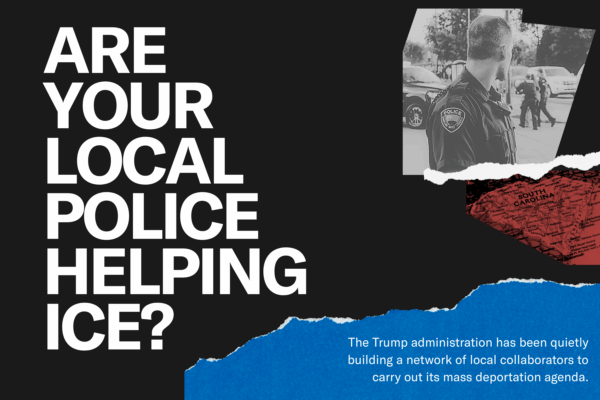Note: This page is continuously updated as more agencies sign agreements with ICE. For more information about 287(g) agreements and how you can push back in your community, see our page 287(g) Agreements in South Carolina.
The second Trump administration has been quietly building a network of local collaborators to carry out its mass deportation agenda.
Local collaboration agreements signed under the 287(g) program are a disaster for civil liberties, a fiscal burden on local governments, and a threat to public safety. Your local law enforcement agency might have already signed an agreement.
Take a look:
You can find a list of participating and pending agencies below or on ICE’s website.
Here's how 287(g) agreements work
Ordinarily in the United States, immigration enforcement is the job of federal agencies. But under Section 287(g) of the Immigration and Nationality Act, U.S. Immigration and Customs Enforcement (ICE) can train and authorize local law enforcement officers to identify, arrest, and detain people for potential deportation.
On the map above, hover or tap on a county to see more details. As you can see, there are three categories of 287(g) agreements. Here they are, with descriptions courtesy of our colleagues at the ACLU of Wyoming:
- Jail Enforcement Model: "Under this model, ICE delegates certain immigration authorities to state and local law enforcement agencies to identify immigrants in state and local custody and place them into immigration proceedings. Corrections officers in local jails, under the supervision of ICE, are deputized by the federal government to interrogate people in their custody about their immigration status and funnel people into the deportation pipeline."
- Warrant Service Officer: "This type of agreement allows ICE to train, certify, and authorize state and local law enforcement officers to serve and execute administrative immigration warrants on people who are in custody in their agency’s jail."
- Task Force Model: "ICE describes this type of agreement as 'a force multiplier' that allows state and local law enforcement agencies to make immigration arrests during routine police enforcement. This model, the broadest and deepest form of collusion with ICE, essentially turns police officers into ICE agents."
ICE collaboration is a new phenomenon in most communities
While Section 287(g) has existed since 1996, local agreements under this law used to be rare. The number of agreements has more than quadrupled nationwide this year, from 135 in 25 states in December 2024 to 628 in 40 states as of May 28, 2025. In South Carolina during that same period, the number of local ICE agreements jumped from 3 to 15.
Until recently, most police chiefs and sheriffs did not participate in immigration enforcement. The recent surge in ICE agreements is often attributed to President Trump and advisor Stephen Miller’s racist mass deportation agenda. The ACLU wrote of the first Trump administration’s expansion of 287(g) agreements, “[W]e found that when it expanded the program exponentially, it used anti-immigrant hate as its selling point.”
State-level officials have also played a role. On Feb. 4, South Carolina Attorney General Alan Wilson wrote a letter to the state’s 46 sheriffs urging them to devote local resources to immigration enforcement.
Public trust and public safety are eroding
Former NYPD Chief William J. Bratton, at the time leading the Los Angeles Police Department, summed up his reasons for rejecting 287(g) agreements in a 2009 opinion piece:
“[W]hen local police enforce immigration laws, it undermines their core public safety mission, diverts scarce resources, increases their exposure to liability and litigation, and exacerbates fear in communities that are already distrustful of police.”
When immigrant communities distrust local police, they are less likely to report crimes and come forward as witnesses. A 2021 article in Political Behavior looked at places where local law enforcement cooperated with ICE and found that members of Hispanic communities who were victims of crimes became less willing to report those crimes.
Criminal justice scholar W. Carsten Andresen issued a warning in May 2025:
“As a criminal justice scholar, I believe the surge of 287(g) agreements sets a dangerous precedent for local policing, where forging relationships and building the trust of immigrants is a proven and effective tactic in combating crime. In my view, the expansion of 287(g) will erode that trust and makes entire communities – not just immigrants – less safe.”
For more information, see Andresen’s article in The Conversation, “Surge of ICE agreements with local police aim to increase deportations, but many police forces have found they undermine public safety.”
Racist enforcement patterns threaten civil liberties
During the Biden administration, the ACLU conducted a review of the state and local law enforcement agencies participating in the 287(g) program at the time. Among the key findings of the 2022 report:
- At least 59% of participating sheriffs had records of anti-immigrant, xenophobic rhetoric, contributing to a continued climate of fear for immigrants and their families, undermining public safety and contributing to the risk of racial profiling
- At least 55% of sheriffs involved in the program had made statements advocating inhumane immigration and border enforcement policies and promoting the misinformation and false claims on which they are based
- At least 65% of 287(g)-participating agencies had records of a pattern of racial profiling and other civil rights violations, including excessive use of force
- At least 77% of 287(g)-participating agencies were running detention facilities with serious and extensive records of inhumane conditions, a fact that implicates the 287(g) program because when the administration partners with these facilities, it tacitly sanctions these conditions
To read the full report, see “License to Abuse: How ICE’s 287(g) Program Empowers Racist Sheriffs.”
Here's what you can do
Most new ICE partnerships in South Carolina were signed by sheriffs. Those are elected positions. The next time your local sheriff is up for election, research the candidates’ positions on this issue. If they haven’t announced their position, ask them about it.
You can also apply pressure at town, city, and county council meetings where budgets for law enforcement are decided. Collaborating with ICE comes at a cost to local taxpayers, and the people who hold the purse strings need to take that into account. To cite one example, a 2019 study by the North Carolina Justice Center found that the cumulative cost to North Carolina taxpayers of collaboration with ICE over a decade was at least $81.7 million.
If your local police force has already entered an agreement with ICE, demand answers about the cost and outcomes of this program. What does it cost, in terms of employee hours and dollars spent? What are the outcomes, and how is this partnership affecting trust between police and the communities they serve?
ICE didn’t always have such a cozy relationship with local law enforcement. Now immigrant communities are fearful, public trust in police is waning, and we hear new stories of ICE’s abuses every day.
As with so many national struggles that can feel overwhelming, we can still turn the tide at the local level.





